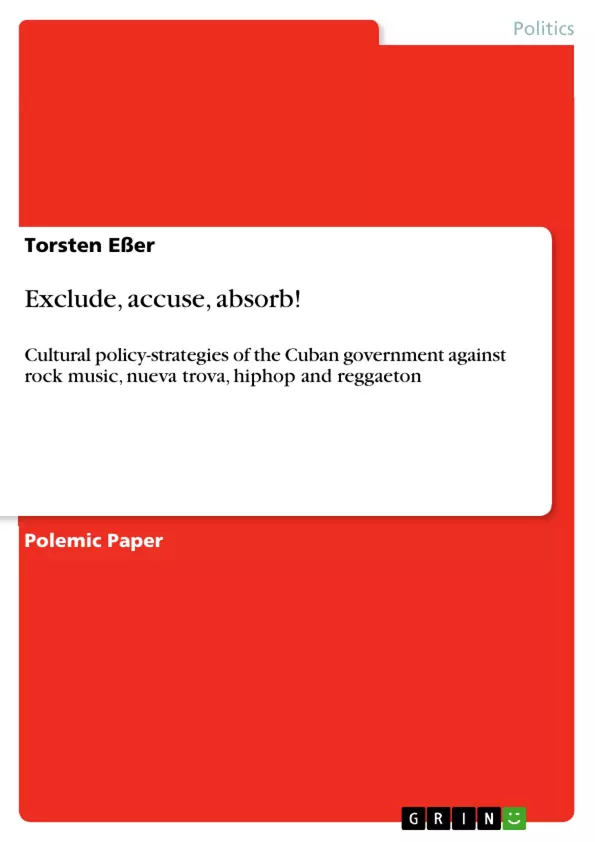A few years after the revolution of 1959, jazz (and rock) became identified by Fidel and his friends as „imperialistic music“. Though it had never been forbidden to play them, Fidel’s „words towards the intellectuals“ left enough space to allow some functionaries to ban it from TV- and radio-broadcasting or to hinder the production of discs. A lot of musicians left their island. In case of the nueva trova-movement in the mid 60ies at the beginning happened the same as with rock music. But there a new strategy showed more success: embracement, which led to promotion by the government. 30 years later the government – exactly a new and young cultural minister – tried to apply this strategy with the growing hiphop-movement and the reggaeton-scene but failed partly. Many rappers – especially the second generation - did not like to be part of the system. This article compares the different strategies which the Cuban government had used during 50 years to battle against disliked music styles and shows their consequences, successes and failures.
Inhaltsverzeichnis (Table of Contents)
- Abstract
- Cultural Policy after the Revolution
- Midnight Music
- History's Paradox: Cuban Hippies in the 1960s
- The Nueva Trova Movement: Acceptance and Embracement
- Hiphop and Reggaeton: A Double-Edged Sword?
- Conclusion
Zielsetzung und Themenschwerpunkte (Objectives and Key Themes)
This article examines the evolution of Cuban government cultural policies towards various music styles, specifically rock, jazz, nueva trova, hiphop, and reggaeton, over a period of 50 years. It analyzes the strategies employed, their consequences, successes, and failures. The overarching objective is to understand how the Cuban government sought to control and shape musical expression, reflecting broader political and ideological agendas.
- The impact of the Cuban revolution on the cultural landscape, particularly in the music scene.
- The government's evolving strategies in dealing with different music genres, ranging from outright suppression to selective acceptance and promotion.
- The political and ideological motivations behind the government's interventions in music, highlighting the perceived threat of "imperialistic" cultural influences.
- The responses of Cuban musicians to these policies, showcasing both resistance and cooperation.
- The consequences of these policies on the development and evolution of music styles in Cuba.
Zusammenfassung der Kapitel (Chapter Summaries)
- The introduction provides a brief overview of the Cuban government's cultural policy post-revolution, highlighting the early attempts to control and influence music expression. It introduces the key themes and the different music genres that will be discussed throughout the article.
- This chapter focuses on the early years of the revolution and the emergence of rock music in Cuba. The government's initial suspicion of rock as "imperialistic" music, leading to its suppression and marginalization, is explored. The chapter delves into the government's efforts to promote alternative music styles like "mocambique" as countermeasures.
- This chapter examines the government's response to the rise of the nueva trova movement in the 1960s. It details how the government shifted its strategy from suppression to embracement, recognizing the potential of the movement to promote revolutionary ideals. The chapter explores the consequences of this shift and its impact on the development of the nueva trova scene.
- This chapter focuses on the rise of hiphop and reggaeton in Cuba during the late 20th and early 21st centuries. It examines the government's attempts to control and influence these new genres, and the varying responses from musicians within these scenes. The chapter highlights the tensions between the government's desire to incorporate these styles while maintaining control, and the musicians' aspirations for artistic freedom.
Schlüsselwörter (Keywords)
The article focuses on the intersection of music, politics, and cultural policy in Cuba. Key terms and concepts include Cuban revolution, cultural control, musical expression, rock music, jazz, nueva trova, hiphop, reggaeton, censorship, suppression, embracement, ideological influences, political motives, and artistic freedom.
Frequently Asked Questions
How did the Cuban revolution affect jazz and rock music?
After 1959, jazz and rock were labeled as "imperialistic music," leading to their marginalization and bans from TV and radio broadcasting.
What was the government's strategy towards the Nueva Trova movement?
Initially treated like rock, the strategy shifted to "embracement," where the government promoted the movement to spread revolutionary ideals.
Why did the Cuban government try to control Hip-hop and Reggaeton?
The government sought to incorporate these genres into the state system to manage their social influence, though many artists resisted this co-option.
What were the consequences of music censorship in Cuba?
Many musicians left the island, and those who stayed often had to navigate a complex landscape of suppression and selective state promotion.
Did the strategy of "embracement" always succeed?
While successful with Nueva Trova, it partly failed with modern movements like Hip-hop, as second-generation rappers preferred artistic independence over being part of the system.
- Quote paper
- Torsten Eßer (Author), 2013, Exclude, accuse, absorb!, Munich, GRIN Verlag, https://www.grin.com/document/460644



